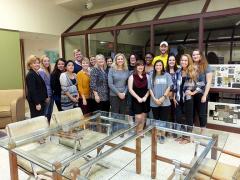
Stephen F. Austin State University interior design students recently collaborated with staff members at the Nacogdoches Treatment Center to create site and floor plans for a proposed assisted living facility for patients with Alzheimer’s disease.
The floor plans feature a community kitchen, family-style dining, private resident rooms with baths, a quiet space, in-house laundry and a multipurpose community/activity area, all housed within a community-oriented, home-like atmosphere.
Dr. Mitzi Perritt, professor in SFA’s School of Human Sciences, explained this project introduces students to designing for special populations.
“The building’s purpose is to house Alzheimer’s patients who can no longer live with their caregivers due to advancement of the disease,” Perritt said.
During the fall semester, five teams of SFA students studied the Texas Accessibility Standards guidelines and researched city and county records for property description, lot size, restrictions and utility placement. Students also reviewed state regulations outlined by the Department of Aging and Disability Services.
Additionally, the students engaged in a Dementia Live simulation to help them understand what it is like to live with dementia, a disease similar to Alzheimer’s disease that affects memory loss.
“This being our first assisted living facility to design, our team researched a great deal and considered many restrictions that apply to this type of facility,” said Remy Follmar, Colmesneil junior interior design major. “This project taught me research is a very important part of design and that gaining knowledge outside of the classroom is equally important. I thoroughly enjoyed this project and the research needed to understand how and why we design a specific way for these patients.”
Students also interviewed Kathy Strong, Nacogdoches Treatment Center executive director, to help understand the center’s needs and desires for their “dream facility.”
“It was interesting to see the concepts the students came up with,” Strong said. “We were amazed at how quickly and efficiently they took our concerns and thoughts and created a design. It’s a great opportunity for us to tap into the knowledge at SFA and working with the students is so important. Nacogdoches is unique in that we are able to work together with the university. It’s a win-win for all of us.”



